|
Books Should Be Free Loyal Books Free Public Domain Audiobooks & eBook Downloads |
|
|
Books Should Be Free Loyal Books Free Public Domain Audiobooks & eBook Downloads |
|
Top Authors |
|---|
|
Book type:
Sort by:
|
By: Ada Leverson (1862-1933) | |
|---|---|
 Tenterhooks
Tenterhooks
The second of the 'Little Ottleys' trilogy, an Edwardian comedy of manners. Several years have passed since the events in 'Love's Shadow', but Bruce Ottley is as difficult and irksome as ever. His beautiful wife Edith continues to gently manage his foibles, and regards him with a fond tolerance. But then she meets the enchanting - and very handsome - Aylmer Ross. The attraction between them is undeniable, and Edith's quiet serenity is shattered. Could this spell the end for the Ottley's marriage?... | |
By: Ada M. Marzials | |
|---|---|
 More Tales in the Land of Nursery Rhyme
More Tales in the Land of Nursery Rhyme
| |
By: Ada Woodruff Anderson (1860-) | |
|---|---|
 The Rim of the Desert
The Rim of the Desert
| |
By: Ada [Illustrator] Budell | |
|---|---|
 Stories to Read or Tell from Fairy Tales and Folklore
Stories to Read or Tell from Fairy Tales and Folklore
| |
By: Adah Isaacs Menken (1835-1868) | |
|---|---|
 Infelicia
Infelicia
Adah Isaacs Menken's short life was full and eventful. Probably born in the American South, she travelled, wrote journalism, became famous as an actress, successfully navigated press scandals about her private life and wrote poetry. This volume collects her poems, which explore, among other things, Judaism, the position of women in society and contemporary events such as the American Civil War. By turns introspective and ferocious, her poetry is as varied and fresh as it was when first published. | |
By: Adah Louise Sutton (1860-1935) | |
|---|---|
 Teddy Bears
Teddy Bears
Set in the early 1900's, this is a delightful story of a tribe of Teddy Bears arrival in the department store and the adventures some of them have when they are brought into a family's home. - Summary by Linda Andrus | |
 Little Maid in Toyland
Little Maid in Toyland
The story portrays the adventures of a young girl and her friends as they magically go through the door of her doll house into a strange world called Toyland. | |
By: Adalbert Stifter (1805-1868) | |
|---|---|
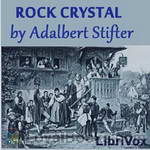 Rock Crystal
Rock Crystal
On Christmas Eve, two children, a brother and sister, leave their grandmother's house in an Alpine village and get lost in the mountain snow. They become trapped among the rock crystals of the frozen glacier. This short and gripping novel, by 19th century Austrian master Adalbert Stifter, influenced Thomas Mann and others with its suspenseful, simple, myth-like story and majestic depictions of nature. Poet W.H. Auden called the work "a quiet and beautiful parable about the relation of people to places, of man to nature."(Introduction by Greg W.) | |
 Rock Crystal (Version 2)
Rock Crystal (Version 2)
Lovely story of two children who get lost in a hazardous winter crossing of an Alpine pass after visiting their grandparents in a neighboring village. Full of beautiful details about the lives of the hardy villagers, and their love for their families and their mountain home. - Summary by Carol Pelster | |
By: Adam Ferguson (1723-1816) | |
|---|---|
 An Essay on the History of Civil Society, Eighth Edition
An Essay on the History of Civil Society, Eighth Edition
| |
By: Adam G. De Gurowski (1805-1866) | |
|---|---|
 Diary from March 4, 1861, to November 12, 1862
Diary from March 4, 1861, to November 12, 1862
| |
 Diary from November 12, 1862, to October 18, 1863
Diary from November 12, 1862, to October 18, 1863
| |
By: Adam Gottlob Oehlenschläger (1779-1850) | |
|---|---|
 The Gold Horns
The Gold Horns
| |
By: Adam L. (Adam Luke) [Editor] Gowans | |
|---|---|
 The Hundred Best English Poems
The Hundred Best English Poems
| |
By: Adam Lindsay Gordon (1833-1870) | |
|---|---|
 Song of Autumn
Song of Autumn
Adam Lindsay Gordon was an Australian poet, jockey and politician. | |
 Poems
Poems
This is a volume of poems by Adam Lindsay Gordon, 'British-born Australian Steeple-Chase Rider and Poet'."The poems of Gordon have an interest beyond the mere personal one which his friends attach to his name. Written, as they were, at odd times and leisure moments of a stirring and adventurous life, it is not to be wondered at if they are unequal or unfinished. The astonishment of those who knew the man, and can gauge the capacity of this city [Melbourne] to foster poetic instinct, is that such work was ever produced here at all... | |
 Hunting Song
Hunting Song
volunteers bring you 14 recordings of A Hunting Song by Adam Lindsay Gordon. This was the Weekly Poetry project for February 24, 2019. ------ Adam Lindsay Gordon was an Australian poet, jockey, police officer, and politician. In this Weekly Poem he raises a glass "..to every sportsman, be he stableman or lord," | |
By: Adam Oehlenschläger (1779-1850) | |
|---|---|
 Aladdin, Or, The Wonderful Lamp (A Dramatic Poem, in Two Parts)
Aladdin, Or, The Wonderful Lamp (A Dramatic Poem, in Two Parts)
This retelling of Aladdin in dramatic verse begins in the humble home of a tailor, whose son spends his days in idleness and brings his parents nothing but grief. Soon, however, this son is brought to a magical grotto, where he finds a great treasure which will bring him his fortune. This story will have some twists and turns that are almost certain to be different from the story you know. - Summary by Devorah AllenCast: Tomas Peter: AladdinJenn Broda: Gulnare, the PrincessMichele Eaton: Nurse to... | |
By: Adam S. (Adam Samuel) Bennion (1886-1958) | |
|---|---|
 Principles of Teaching
Principles of Teaching
| |
By: Adam Smith (1723-1790) | |
|---|---|
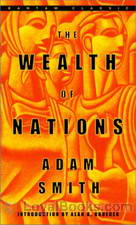 The Wealth of Nations
The Wealth of Nations
Adam Smith’s “The Wealth of Nations” gives an in-depth discussion of different economic principles like the productivity, division of labor and free markets. Although written and published more than 200 years ago, it’s still hailed as one of the most original works in the field of economics and is still used as a reference by many modern economists. “An Inquiry Into the Nature and Causes of the Wealth of Nations” is the complete title of this book and it was first published in 1776, the same year that the American colonies declared their independence from Britain... | |
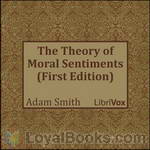 The Theory of Moral Sentiments (First Edition)
The Theory of Moral Sentiments (First Edition)
“How selfish soever man may be supposed, there are evidently some principles in his nature, which interest him in the fortunes of others, and render their happiness necessary to him, though he derives nothing from it, except the pleasure of seeing it.” (from The Theory of Moral Sentiments) Adam Smith considered his first major book, The Theory of Moral Sentiments, his most important work. Indeed, the tome was a wild success upon its publication, selling out immediately. It has not lost popularity since... | |
By: Adam Storey Farrar (1826-1905) | |
|---|---|
 History of Free Thought in Reference to The Christian Religion
History of Free Thought in Reference to The Christian Religion
| |
By: Adam White (1817-1879) | |
|---|---|
 Heads and Tales : or, Anecdotes and Stories of Quadrupeds and Other Beasts, Chiefly Connected with Incidents in the Histories of More or Less Distinguished Men.
Heads and Tales : or, Anecdotes and Stories of Quadrupeds and Other Beasts, Chiefly Connected with Incidents in the Histories of More or Less Distinguished Men.
| |
By: Addie Chisholm | |
|---|---|
 Why and How : a hand-book for the use of the W.C.T. unions in Canada
Why and How : a hand-book for the use of the W.C.T. unions in Canada
| |
By: Addison B. Poland | |
|---|---|
 Famous Men of the Middle Ages
Famous Men of the Middle Ages
| |
By: Addison Van Name | |
|---|---|
 Catalogue of the William Loring Andrews Collection of Early Books in the Library of Yale University
Catalogue of the William Loring Andrews Collection of Early Books in the Library of Yale University
| |
By: Adelaide Anne Procter (1825-1864) | |
|---|---|
 Three Rulers
Three Rulers
Adelaide Anne Procter was an English poet and philanthropist. She worked prominently on behalf of unemployed women and the homeless, and was actively involved with feminist groups and journals. She became unhealthy, possibly due to her charity work, and died of tuberculosis at the age of 38. Procter's literary career began when she was a teenager; her poems were primarily published in Charles Dickens's periodicals Household Words and All the Year Round and later published in book form. Her charity work and her conversion to Roman Catholicism appear to have strongly influenced her poetry, which deals most commonly with such subjects as homelessness, poverty, and fallen women... | |
 Legends and Lyrics Part 2
Legends and Lyrics Part 2
| |
 From Queen's Gardens
From Queen's Gardens
This is the third part of a collection of poetry written by English female poets. This part of From Queen's Gardens is a collection of 29 poems by Adelaide Anne Procter. - Summary by Carolin | |
By: Adelaide Cadogan | |
|---|---|
 Lady Cadogan's Illustrated Games of Solitaire or Patience New Revised Edition, including American Games
Lady Cadogan's Illustrated Games of Solitaire or Patience New Revised Edition, including American Games
| |
By: Adelaide Crapsey (1878-1914) | |
|---|---|
 To The Dead in the Graveyard Underneath My Window
To The Dead in the Graveyard Underneath My Window
Her death was tragic. Full of the desire of life she yet was forced to go, leaving her work all unfinished. Her last year was spent in exile at Saranac Lake. From her window she looked down on the graveyard — "Trudeau's Garden," she called it, with grim-gay irony. from the forward to Verse, by Claude Bragdon - Summary by from the forward to Verse,by Claude Bragdon | |
 Verse
Verse
Adelaide Crapsey's experimental poetry included her creation of the cinquain. This recording was taken from the posthumously published and expanded 1922 edition of her verse. | |
By: Adelaide Hoodless (1858-1910) | |
|---|---|
 Public School Domestic Science
Public School Domestic Science
| |
By: Adelaide L. (Adelaide Lisetta) Fries (1871-1949) | |
|---|---|
 The Moravians in Georgia, 1735-1740
The Moravians in Georgia, 1735-1740
| |
By: Adelaide M. G. Campbell | |
|---|---|
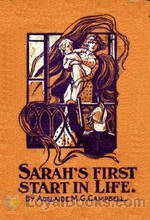 Sarah's First Start in Life.
Sarah's First Start in Life.
| |
By: Adelbert von Chamisso (1781-1838) | |
|---|---|
 Peter Schlemihl
Peter Schlemihl
| |
 Peter Schlemihl
Peter Schlemihl
| |
By: Adele Garrison | |
|---|---|
 Revelations of a Wife
Revelations of a Wife
Adele Garrison was the nom de plume of Nana Springer White, an American writer. Her career included time as a schoolteacher in Milwaukee. She later worked as an editor for the Milwaukee Sentinel and then a reporter and writer for the Chicago Examiner and Chicago American. “Revelations of a Wife” ran as a serial story in her daily newspaper column in multiple American newspapers from 1915 until the Depression. It told the story of the marital ups and downs of Margaret “Madge” Graham, an independent-minded former schoolteacher, and her husband Dicky, an artist. At the height of the story’s popularity, it had one million regular readers. | |
By: Adelia B. Beard (1857-1920) | |
|---|---|
 On The Trail: An Outdoor Book for Girls
On The Trail: An Outdoor Book for Girls
Lina and Adelia Beard, co-founders of the first American girls' scouting group, originally called the Girl Scout Society, then the Girl Pioneers, and finally as the Camp Fire Girls, provide practical advice and encouragement to girls and young women who wish to explore a "free, wholesome, and adventurous outdoor life." - Summary by Christine Lehman, aka stoogeswoman | |
By: Adelia Belle Beard and Lina Beard | |
|---|---|
 On the Trail
On the Trail
On The Trail, An Outdoor Book For GirlsBy Lina Beard And Adelia Belle BeardPRESENTATION The joyous, exhilarating call of the wilderness and the forest camp is surely and steadily penetrating through the barriers of brick, stone, and concrete; through the more or less artificial life of town and city; and the American girl is listening eagerly. It is awakening in her longings for free, wholesome, and adventurous outdoor life, for the innocent delights of nature-loving Thoreau and bird-loving Burroughs... | |
By: Adeline Sergeant (1851-1904) | |
|---|---|
 Under False Pretences A Novel
Under False Pretences A Novel
| |
 Name and Fame A Novel
Name and Fame A Novel
| |
 A Life Sentence A Novel
A Life Sentence A Novel
| |
 Brooke's Daughter A Novel
Brooke's Daughter A Novel
| |
 A True Friend A Novel
A True Friend A Novel
| |
By: Adeline Trafton (1845-) | |
|---|---|
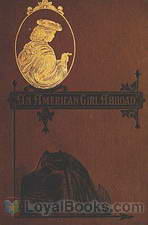 An American Girl Abroad
An American Girl Abroad
| |
By: Adin Ballou (1803-1890) | |
|---|---|
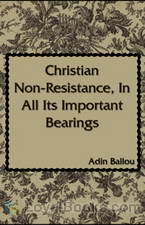 Christian Non-Resistance, In All Its Important Bearings
Christian Non-Resistance, In All Its Important Bearings
In this short book, Ballou defends the notion that non-resistance (today we call it non-violence) is the superior Christian method, and the one practiced by Jesus himself. | |
By: Adlai E. (Adlai Ewing) Stevenson (1835-1914) | |
|---|---|
 Something of Men I Have Known With Some Papers of a General Nature, Political, Historical, and Retrospective
Something of Men I Have Known With Some Papers of a General Nature, Political, Historical, and Retrospective
| |
By: Adolf Hausrath (1837-1909) | |
|---|---|
 Klytia A Story of Heidelberg Castle
Klytia A Story of Heidelberg Castle
| |
By: Adolf von Harnack (1851-1930) | |
|---|---|
 History of Dogma, Volume 1
History of Dogma, Volume 1
| |
By: Adolph Keitel | |
|---|---|
 Government By the Brewers?
Government By the Brewers?
| |
By: Adolph Streckfuss (1823-1895) | |
|---|---|
 Too Rich A Romance
Too Rich A Romance
| |
 Castle Hohenwald A Romance
Castle Hohenwald A Romance
| |